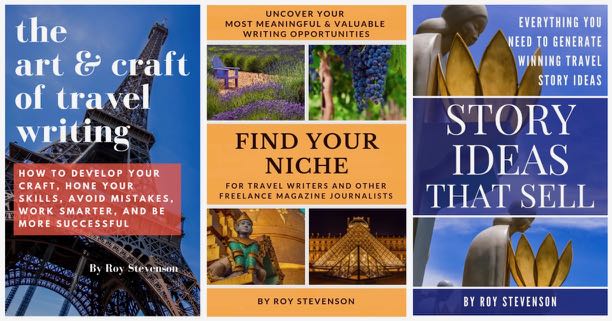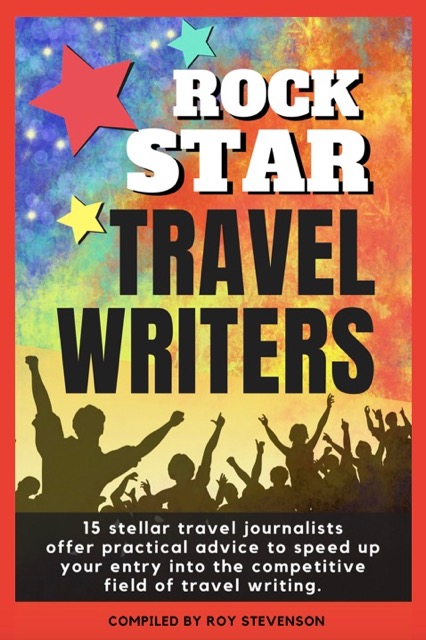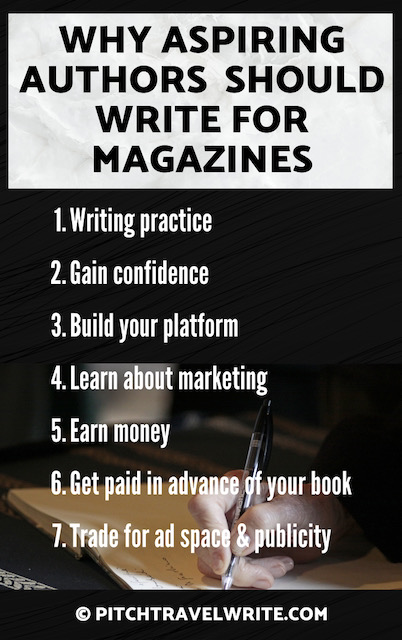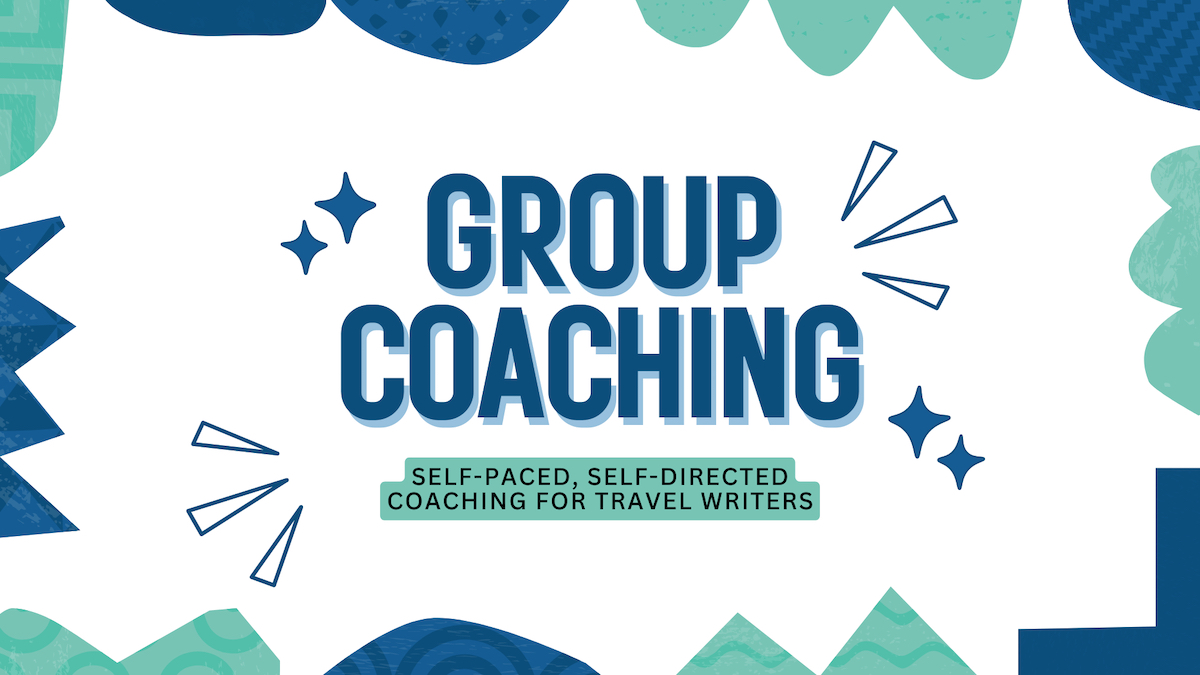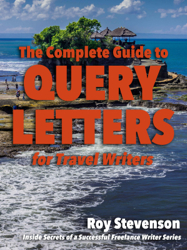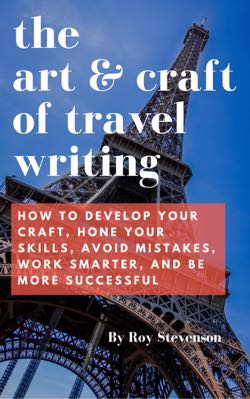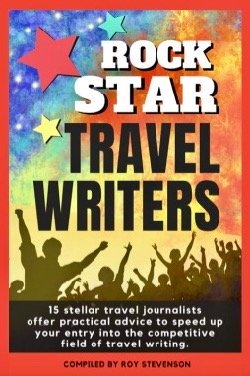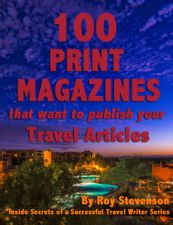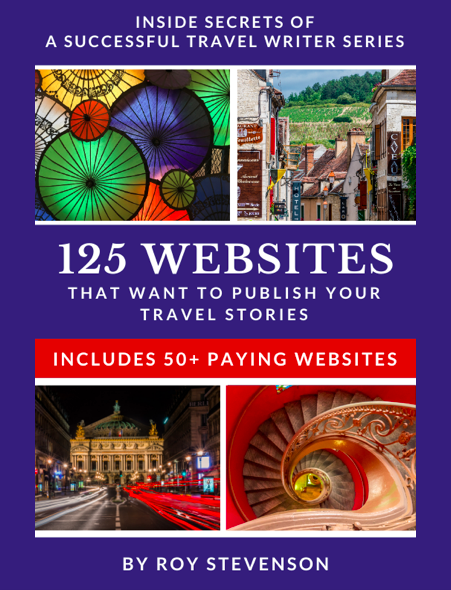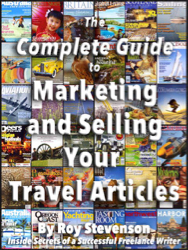- Home
- Business Basics for Travel Writers
- Can You Earn Enough Money as a Travel Writer?
Can You Earn Enough Money
as a Travel Writer?
By Roy Stevenson
Can you earn enough money as a travel writer? This is the biggest question aspiring writers want answered.
Veteran travel writers make it all look so easy. They jet around the world, take private helicopter rides over glistening glaciers, stay in exotic jungle and beach resorts, and stroll along pristine, white sandy shores under gently swaying palm trees.
I’ve certainly done all those things on travel writing assignments. And from my Facebook posts, you’d think it was easy-peasy.
Lots of people want to be travel writers, attracted by the apparent glamor of this profession and the free travel opportunities. I can certainly understand this.
For the travel writers who’ve mastered the game, life is good! This has been my experience. In fact, I’ve never felt as fulfilled as I have in my fifteen years as a travel writer.
But is it really easy?
How exactly do you get paid to live this idyllic life?
And is it possible to earn enough money?
 Our outdoor living space at Villa Mathis Resort, Bali, Indonesia. Missing from the photo: the travel writer hard at work (indoors) catching up on writing tasks.
Our outdoor living space at Villa Mathis Resort, Bali, Indonesia. Missing from the photo: the travel writer hard at work (indoors) catching up on writing tasks.Here’s an email I received a while ago from a novice writer. It was a lengthy email, so I’ve edited it back to the most important question to get to the crux of this issue.
“I have one question that everyone wants to ask at travel writer’s conferences and workshops, but no one does, perhaps because it seems indiscreet: Can you really make money at this? Or is travel writing really for people whose financial security is otherwise assured by trust fund or hefty retirement income and who are going to travel anyway?
As a writing coach and mentor, I’m often asked the BIG question, “Can I really make money as a travel writer?”
The short answer is “yes”. You can make money as a travel writer.
It’s a simple formula: come up with great story ideas and sell them to magazine editors.
Use Travel Writing As A Secondary Stream of Income to Earn Enough Money
If you want to break into travel writing, and have a steady source of income from a job, the best advice I can give you is, “Don’t give up your day job.”
When you're just starting out in travel writing the cash flow is small and sporadic. If you have bills to pay, like most people do, you'll want to hang onto a steady source of income to get the bills paid.
It’s okay to be a part-time travel writer or blogger. For beginners, this is practically mandatory. Freelance income is variable so you can’t initially depend on it to pay your bills.
Many solo businesses get started as part-time endeavors, while you already have a job. It’s the least stressful way to start a business.
Most of the writers I meet on press trips and at travel writing conferences are part-timers. They do it for fun, for pin money, and for the occasional press trip. My guesstimate is that 90% of all travel writers are part-time.
Many travel writers have full-time jobs - often in a totally different industry. They send out queries in their spare time, and they use their vacation time to go on press trips. This is the best way to get started. Use travel writing as a secondary stream of income and you won't need to worry about whether you can earn enough money.
Others work a part-time job for some steady income. For my first couple of years freelancing I did this, too. At various times, I’ve taught part-time at two Seattle universities and a local community college.
Again, that took the pressure off me to earn enough income to pay the bills.
In other cases, you might have a working spouse willing to take responsibility for paying the bills. That’s how I started out freelancing. My wife had a great corporate job that paid the bills while I learned the freelance travel writing trade.
I didn't earn enough income to pay the bills and didn't need to worry.
Other travel writers live off investments, retirement incomes, trust funds, lucrative divorce settlements, or some combination of these.
Break into Travel Writing
with the Creative Pack
The Creative Pack includes 3 eBooks that are the starting point for every travel writer: dreaming up unique story ideas that you can sell, finding the best writing niches for you based on your interests, passions and experience, and the art & craft of travel writing. They’re the pieces of the puzzle that come before you ever write a query letter to sell your articles to magazine editors.
If you're just getting started in travel writing, this group of resources will help you improve your craft, generate story ideas that sell, and develop your own unique and meaningful niche.
These eBooks can be purchased separately, but when you buy the bundle you'll save more than 10% off individual prices! Learn more here ...
My Travel Writing Journey
When I started freelance writing I worked 10-12 hours/day, 7 days/week, for my first few years. Obviously, I wanted to be a travel writer really badly!
I hasten to add that this fierce dedication was also motivated in part by the fact that my wife had generously agreed to pay the bills for a while. She gave me two years to break into travel writing and start to earn enough money.
What is enough income? Everyone's needs are different. I wanted to see a regular flow of income each month of $2000 - $3000. That's not a lot of money but in freelance travel writing it took some time to get there.
Those long hours were the price I was willing to pay to learn the ropes and get established. I didn’t want to go back to working for the man! I was under the gun!
My sales and marketing skills evolved rapidly. Right from the start I was able to attain a high level of success. It was worth the long hours of work. After a couple years I started to earn enough money to quit my part-time jobs.
In less than nine years, I managed to sell more than 1,000 articles to 200+ regional, national, and international magazines, specialty magazines, custom publications, newspapers, trade journals, in-flights, on-boards, and online travel magazines and blogs. I’m considered to be one of the most prolific freelance writers in the U.S.
Today, I have confidence that I’ll sell 90% of the stories I pitch to magazines. I may not always place my travel stories exactly where I hope. But I usually sell them to print magazines somewhere around the world and get paid.
And, I know plenty of other travel writers that are consistently selling their stories and making money. So, it can be done! You can make money as a travel journalist.
You Have To Do The Work to Earn Enough Money and Keep the Income Flowing In
Scratch every professional travel writer and they’ll tell you they work hard at it. It requires a combination of talents, skills and abilities to consistently sell your travel stories to paying magazines.
It takes plenty of practice and patience to learn to break through the early travel writing barriers. It takes time to get established, build your bylines, and start bringing in a regular cash flow to earn enough money.
The reality of travel writing is that if you don’t do the work, the closing ratio for your queries will be very low. And you won’t earn enough money - it's as simple as that.
Freelance travel writing is just like any other business. It involves hard work. And it takes talent to get your stories published in top shelf glossy magazines.
Over the past two years, I’ve coached more than fifty neophyte writers through the entire travel writing marketing process. That means:
- Dreaming up story ideas that will sell
- Creating viable magazine distribution lists
- Writing enticing query letters
- Writing publishable travel articles
- Getting repeat business with editors
What I’ve learned is most novice writers' story ideas, query letters, and sales skills are lacking. Beginners are at the bottom of the learning curve – or more like a steep cliff, really. It’s easy to blow your prospects with editors with a few ill-chosen sentences, or from a lack of insider knowledge.
The average neophyte travel journalist has a closing ratio around 10%. This means that only one beginner's query in ten is likely to be picked up by a paying publication. A talented beginner might hit 20%, but this is exceptional.
Even seasoned travel writers consider themselves lucky to sell 25%-40% of the stories they pitch. You have to pitch and turn over a lot of stories to make money. It takes consistent work.
Many people dream of quitting their jobs and being their own boss. If you love to travel and you love to write, becoming a travel writer is a satisfying way to tell people about your journeys. Whether or not you can earn enough money depends entirely on you.
If you put in the work needed to succeed, and give yourself time to get established, you can make money as a travel writer. But "what is enough money?" is your call - no one else can answer that question for you.
Have you ever wondered how some travel writers consistently get their stories published in the top shelf travel magazines?
In my new book, Rock Star Travel Writers, you’ll learn the insider tips, tools, tactics and habits that leading travel journalists use to land assignments in the world’s most prized travel glossies.
In this book you’ll hear about the nuts-and-bolts of successful travel writing. You’ll read about each writer’s personal journey into the freelancing world. And they’ll give you their best insights of how they’ve broken into the world’s most treasured travel publications.
No matter where you are on your travel writing journey, or what challenges you face, the advice in these pages will help you. Each writer has something different to teach you. Learn more and purchase the book ...
More Related articles . . .
Getting Paid for Your Travel Stories
Five Travel Writing Secrets for Success
Business Basics for Travel Writers
How to Make Money Travel Writing

Roy Stevenson is a professional travel writer and the author of www.PitchTravelWrite.com. Over the past ten years, he’s had more than 1000 articles published in 200 magazines, trade and specialty journals, in-flights, on-boards, blogs and websites and has traveled on assignment around the U.S. and to dozens of international destinations.
IF YOU ENJOYED THIS POST, GET UPDATES. IT'S FREE.
